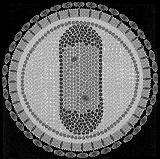Equine Infectious Anemia Case Reported in Surrey, British Columbia

On July 9, 2025, a case of Equine Infectious Anemia (EIA) was confirmed in a horse located in Surrey, British Columbia. The infected animal underwent testing at the request of its owner to comply with biosecurity measures, despite not exhibiting any clinical signs of the disease at the time of testing. Following the positive result, movement restrictions were imposed on the infected horse and other equines present on the premises. Initial assessments indicate that additional horses are housed at the affected location.
Equine Infectious Anemia is a viral disease that compromises the immune system of horses. The virus is primarily transmitted through the exchange of body fluids, particularly via blood-feeding insects like horseflies. It can also spread through the use of contaminated needles or instruments. The Coggins test is a diagnostic tool used to identify antibodies indicative of the EIA virus in a horse's blood. Many U.S. states mandate proof of a negative Coggins test for horses to travel between states. Once a horse is infected with EIA, it remains infected for life and can serve as a reservoir for the virus.
The symptoms of EIA can be subtle, with not all horses displaying visible signs of illness. However, those that do may experience a range of symptoms, including progressive weight loss, muscle weakness, decreased stamina, fever, depression, and anemia. Notably, there is neither a vaccine nor a cure for EIA. Horses diagnosed with the disease face dire outcomes: they may be euthanized, die, or must be subjected to stringent quarantine conditions, remaining isolated at least 200 yards from any uninfected equines for the remainder of their lives.
The implications of EIA are significant not only for the animals affected but also for the equine industry as a whole. According to Dr. Emily Carter, an equine epidemiologist at the University of British Columbia, “The detection of EIA in a local population can lead to heightened biosecurity measures, impacting horse movement and trade.” The equine industry in British Columbia is particularly vulnerable to such outbreaks, as horses are frequently transported for competitions and breeding purposes, making biosecurity protocols essential for prevention.
The Equine Disease Communication Center (EDCC), a nonprofit organization dedicated to disseminating information about equine diseases, plays a crucial role in managing such outbreaks. The EDCC utilizes data from various sources, including government reports and veterinary assessments, to provide timely updates and alerts to horse owners and stakeholders in the industry.
As the situation evolves, stakeholders within the equine community are urged to remain vigilant and adhere to biosecurity measures. The recent discovery of an EIA case underscores the need for continued education regarding the disease, its transmission, and the importance of regular testing. Experts recommend that horse owners familiarize themselves with the symptoms of EIA and maintain communication with their veterinarians regarding preventative care and testing protocols.
In summary, the confirmation of an EIA case in Surrey serves as a critical reminder of the ongoing challenges posed by infectious diseases in equine populations. The collaboration between veterinarians, researchers, and equine organizations is vital to mitigate the spread of such diseases and protect the health of horses across British Columbia and beyond.
Advertisement
Tags
Advertisement





